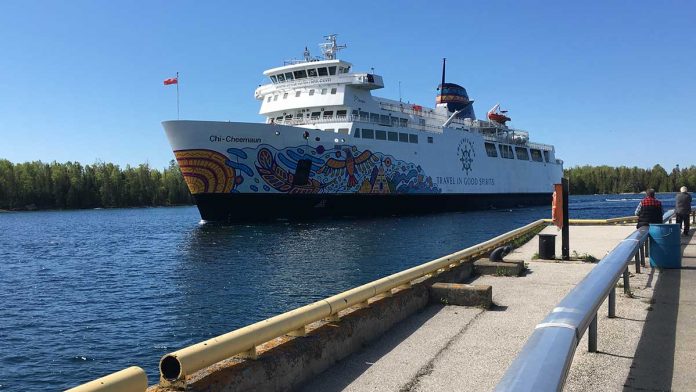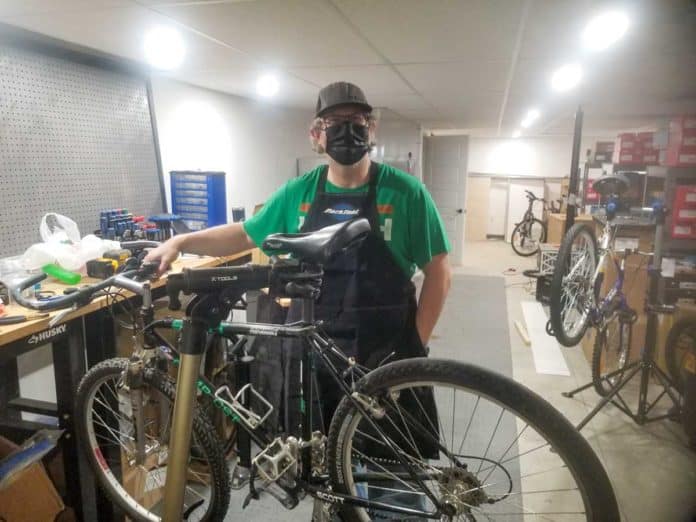Moving to Manitoulin has been as much a spiritual as a physical journey for Eddie Gough. His story is, quite literally, the tale of a long-lost Native son whose complex path of pain, recovery and discovery has culminated in a triumphant return to his roots.
Born in North York in 1979, Eddie was immediately removed from his Indigenous mother, placed into care and put up for adoption. He was a casualty of ‘Sixties Scoop’ government policies that presumed he would be better off growing up in a white home and integrated into white culture.
His English father and Dutch mother made him part of their family when they adopted Eddie at six months old, joining an already adopted older Caucasian sister. He grew up as a typical middle-class kid in Mississauga – except he wasn’t at all typical of other kids in the neighbourhood or the schools he attended. Eddie, the only Indigenous child he ever saw, was raised without any connection to his heritage or awareness of his biological family.
“I didn’t know another Native person my whole life,” explains Eddie. “I knew I was different and wanted so much to be white like my family and schoolmates. I always felt alone because I felt I didn’t belong.”
Although he excelled academically, Eddie’s discomfort with not fitting in began to manifest itself in lashing out, sometimes violently. He admits to being a handful to raise and assumed that, when he was punished, it was not so much for what he had done but, rather, for who he was. “My behaviour was a cry for attention and affection because I felt so unworthy of love.”
Eddie takes the blame for his parents’ marriage break-up and realizes how difficult it was for his single mom to raise him. When she turned to the Children’s Aid Society for help, when Eddie was 14, he was taken from his family home and shuttled from group home to group home where “there was no real connection or the support that I needed.” He ran away frequently and soon found himself on the streets. “It got to the point that I was sleeping in a drug house with scary adult addicts who were violent with each other, but it was still better than being alone.”
Eddie found his way back to his old neighbourhood where he spent a lot of time with his best friend, Sean Maxwell, who had befriended him when they were both 12 years old. Sean faced his own challenges, having been raised by an alcoholic single mom who was murdered when he was just 16. The bond between the boys was stronger than anything they had experienced within their own families. They were true soul mates who had each other’s backs. That included a suicide pact to ‘check out’ together if the burdens of life became too much to bear.
In his early 20s, Eddie found a full-time job in a company where he worked for 13 years. “It was more than a job, it kept me going, giving me a reason to get up in the morning.” On the surface, his life looked normal but there was an underlying emptiness that he didn’t know how to fill no matter how he tried to escape it or how hard he partied to ignore it.

For many years, Eddie, Sean and their circle of friends did lots of booze and drugs, further contributing to Eddie’s sense of despair. In time, he preferred being alone as he struggled with mental health and addiction problems, a downward spiral that eventually sabotaged his financial wellbeing and career. When he finally hit bottom, he turned to his adoptive mom in a cry for help that she heeded, sending him to an addiction treatment centre where he spent over three months.
Eddie’s first foray back into the world failed, as often happens with recovering addicts, but he was determined to turn his life around. “I knew I would eventually have to face my fears and fix this puzzle that had become life.”
After that relapse, Eddie began attending Alcohol Anonymous meetings where he says he continued the struggle to find a connection to something greater than himself. On a particularly difficult day, he admitted himself to the emergency department at the Centre for Addiction and Mental Health (CAMH) in Toronto seeking help to deal with suicidal thoughts. There, he was connected to a psychiatrist and crisis counselling, the first step forward on his path to a new life. Tragically, just days later, he received news that his lifelong friend, Sean, had lost his own battle with depression and committed suicide.
That shattering incident coincided with another equally life-changing event in Eddie’s life. He began to receive counselling and support from an Indigenous social worker at CAMH who introduced him not just to Indigenous programming but who also nurtured Eddie’s cultural identity. “For the first time, I felt a connection to myself. It gave me hope.”
Eddie began to study social work services at the First Nations Technical Institute (FNTI) in Tyendinaga Mohawk Territory near Belleville, where he was embraced by elders and community members. That support fuelled his passion for his studies at the institute, which offers culturally enriched post-secondary programs in partnership with several Ontario colleges and universities.
Eddie’s CAMH social worker and mentor also referred him to Anishnawbe Health Toronto, whose model of health care for Indigenous clients marries both western and traditional Indigenous approaches. He volunteered there and received a student placement while going to school at FNTI, enabling him to spend time with elders who taught him about traditional healing. After graduation, he was hired on as a traditional helper, continuing to enrich his understanding of the Indigenous way of life.
Eddie maintained regular contact with friends and supporters in Tyendinaga and FNTI. They backed him in taking the next crucial step on his path of self-discovery, finding out where he came from – and belonged. His adoptive mother had procured his Indian Status card when he was young, so he knew his birth mother was originally from Wiikwemkoong. He learned about the community’s annual powwow and planned his first visit to Manitoulin in August of 2018.
While organizing the trip, a documentary film crew conducting interviews at FNTI at the time asked if they could join Eddie on his journey to document his experience. The rest is history.
Eddie not only connected with Anishinaabe culture at the powwow. Incredibly, he also met members of his biological family that he never even knew existed!
“The weekend unfolded so magically. I met some of my siblings and aunts and uncles, which led to meeting my biological mother and father in time.”
That powerful reconnection motivated Eddie to consider making Manitoulin his home. A conversation with an FNTI friend from Birch Island, Candace Jacko, helped make that possible by opening a door of opportunity for him. She knew of a job opening in Aundeck Omni Kaning (AOK) First Nation that she was convinced had Eddie’s name on it. Two years ago, he took a leap of faith and became a counsellor in the community’s Gwekwaadziwin Miikan land-based mental health treatment program. The Indigenous program, based on the Seven Grandfathers teachings, takes a holistic approach to healing by connecting people to the land and helping them rediscover the depths of their identity through traditional medicine, ceremonies, guidance from counsellors and traditional knowledge keepers.
“This is how I found the depth of my own healing – through a deep-rooted connection to my community and traditional teachings. I now see my struggles in the past as a gift that I can carry forward to help others deal with their challenges and find their own gifts within themselves. Being in this helper role is a continuation of my growth and development. For me, being on the Island and doing this work is part of my ongoing healing.”
Good things continue to happen to Eddie, despite his childhood doubts about whether he was deserving of them. His life today includes acceptance into the community of AOK, where he feels at home and comfortable in his own skin. Especially positive, what began as a roommate relationship has blossomed into a romance with community member Candy Corbiere. She has welcomed him into her Indigenous family where he continues to learn local traditions, history and the language.
In his spare time, Eddie visits Indigenous communities and western agencies, telling his uplifting story in hopes of inspiring others to pursue their own healing journeys. It is another way that he experiences peace and contentment in finding his way back home.
Author’s note: As someone who has interviewed thousands of people over the course of my long career, I can honestly say that Eddie’s story is one of the most compelling and inspirational I have heard. I can also attest to his tremendous communications skills and strongly encourage readers to view the documentary made about his amazing adventure in Wikwemikong – ‘Roots Calling’ https://vimeo.com/ondemand/rootscalling2018 – to learn more about his remarkable story in his own words, which I could never hope to match.





